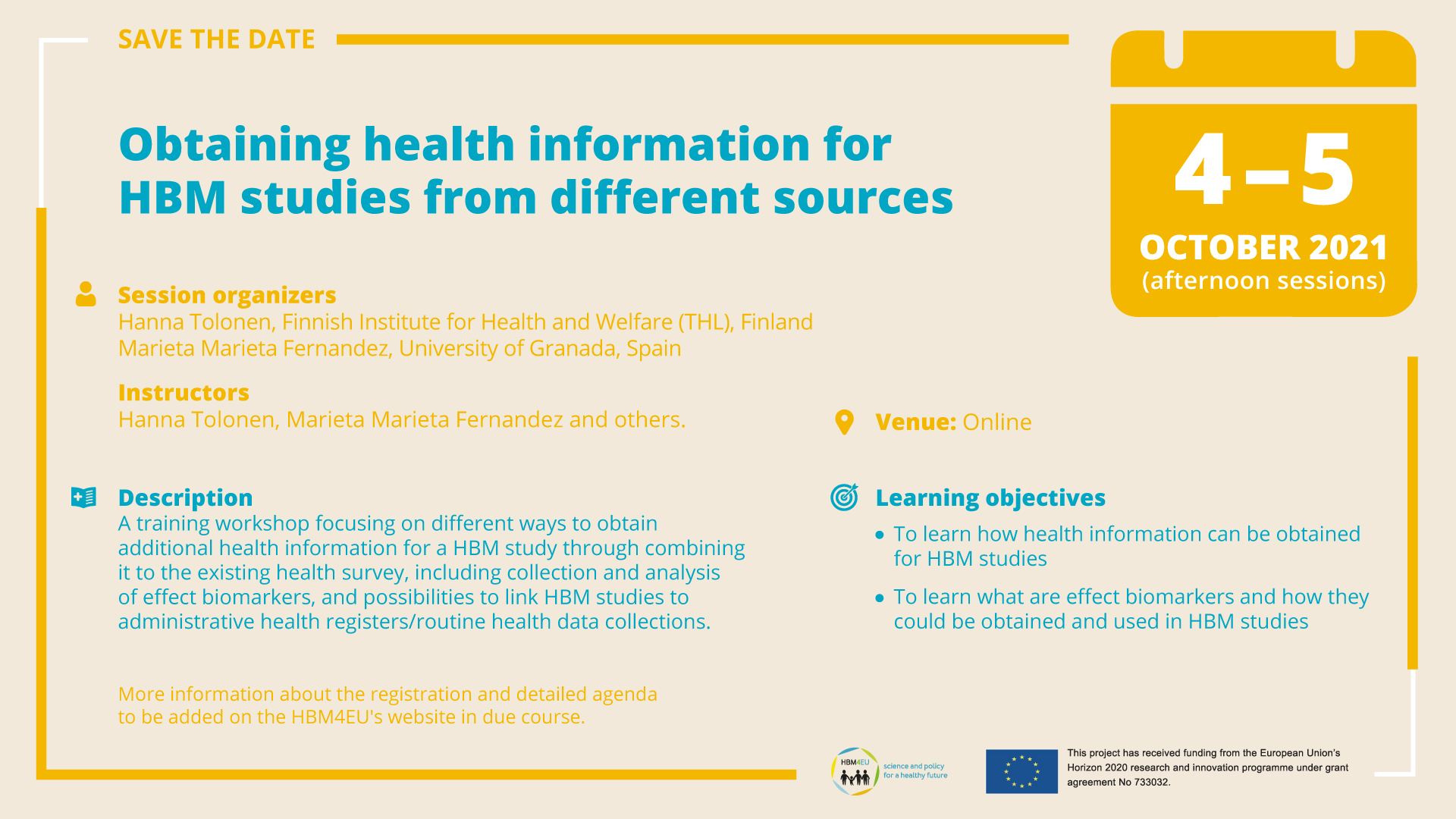The broad range of national experience held by HBM4EU partners contributed a diversity of skills and solid expertise to training and capacity activities generating added value in terms of increased scientific excellence through an exchange of expertise, including training to promote the use of common methods and protocols. In this way, the HBM4EU promoted the adoption of best practices in HBM activities across Europe.
The HBM4EU training programme includes both basic courses, targeted courses, workshops, and train-the-trainer sessions, as well as capacity building for PhD students. The programme was developed on the basis of a survey of the needs of HBM4EU partners matched against available training capacities.
Previous HBM4EU trainings
- Workshop on Chemical Mixtures: Lessons we are learning from HBM4EU
An online training workshop on chemical mixtures took place on 14 and 15 October 2021. Led by Mirjam Luijten (RIVM), Erik Lebret (RIVM), Jelle Vlaanderen (IRAS), Andreas, Kortenkamp (BRUNEL) and Robert Barouki (INSERM), it focused on improving current procedures for risk assessment of chemical mixtures.
The aim was to discuss recommendations for further research and for policy development regarding chemical mixtures, using the insights and lessons being learned within HBM4EU. In this context, a series of of four pre-conference webinars were held for fHBM4EU partners and stakeholders. These involved:
- Patterns in real-life exposures to mixtures; results from network analyses in WP15.1
- Health risk from exposure to mixtures; results from the case studies in WP15.3
- Suspect screening of mixtures; results from the SPECIMEn pesticide study in WP15.2
- EC’s Chemicals Strategy for Sustainability; context of mixture risk assessment and management
- Workshop on ‘ Obtaining health information for HBM studies from different sources
An online training workshop on ‘Obtaining health information for HBM studies from different sources’ organised by HBM4EU partners took place on the 4-5 October 2021 (afternoon sessions from 13:00 – 17:00 CET).
The training, led by the Finnish Institute for Health and Welfare (THL) and the School of Medicine Center of Biomedical Research (CIBM) University of Granada ((UGR, Spain) falls under WP11 – Linking HBM, health surveys and registers and WP 14 – Effect biomarkers.
It focuses on different ways to obtain additional health information for a HBM study through combining it to the existing health survey, including collection and analysis of effect biomarkers, and possibilities to link HBM studies to administrative health registers/routine health data collections.
- how health information can be obtained for HBM studies
- what are effect biomarkers and how they could be obtained and used in HBM studies
Further information on the programme please click here.
- Workshop on Results on the HBM4EU’s chromate occupational study
“Cr(VI) is a carcinogen to which people may be exposed in the workplace. Although Cr(VI) compounds are subject to authorisation under Regulation (EC 1907/2006) concerning the Registration, Evaluation, Authorisation and Restriction of Chemicals (REACH), these compounds are still widely used in different applications, especially in surface treatment of different metallic objects. In addition, workers may be exposed to Cr(VI) formed during hot processes, such as welding.
HBM4EU chromate study evaluated the occupational exposure to Cr(VI) in surface treatment activities and welding in eight different countries in Europe. The study included approximately 40 companies and in total of almost 580 workers and control subjects. Research brief of the study is available here.
The first results of the study are presented in this webinar targeted specifically to industry, workers representatives, regulatory agencies and policy makers. The specific objectives of the webinar are:
- Inform on the results of the HBM4EU Chromate study.
- Give recommendations to workplaces on the monitoring of CrVI exposure.
- Provide information that support policy action.
- Support the science to policy framework.
Yo can find the programme here.
- 3rd HBM4EU Training School:
The 3rd HBM4EU training school was held on 17 – 21 June 2019 at Masaryk University in Brno, Czech Republic. You can find the programme here.
- 2nd HBM4EU Training School:
The 2nd training school was held on 19 – 23rd November 2018 in Nijmegen, The Netherlands. You can see the programme here.
- 1st HBM4EU Training School:
The 1st HBM4EU Training School was held on 18 – 22 June 2018 in Ljubljana, Slovenia. You can see the programme here.
- HBM4EU webinar on ethics:
A webinar on ethics requirements under HBM4EU was held on 12 June 2017. The webinar was recorded and is available for viewing here.
External training opportunities
Online course on Adverse Outcome Pathways (AOPs):
An Online course has been developed to promote knowledge of and participation in the AOP process, including submissions to the AOP Wiki.
The course was designed and developed by etioLogic, LLC for the Human Toxicology Project Consortium (humantoxicologyproject.org) and is freely available to any and every one. The course can be downloaded as zip files from https://humantoxicologyproject.org/about-pathways-2/aop-online-course/ or run directly online by clicking on the links below.
For an overview and historical perspective of the AOP framework, click here:
https://aopwiki.org/training/aops/
For training on the AOP-Wiki, click here:
https://aopwiki.org/training/wiki/
For questions or suggestions regarding the course, please contact the course sponsor via the e-mail address available at:
https://humantoxicologyproject.org/about-pathways-2/aop-online-course/
Disclaimer
The HBM4EU project was launched in 2016 with the aim of improving the collective understanding of human exposure to hazardous chemicals and developing HBM as an exposure assessment method. The project had €74m in funding and jointly implemented by 120 partners from 28 participating countries – 24 EU member states plus Norway, Switzerland, Iceland and Israel and the European Environment Agency. One of its aims was to ensure the sustainability of HBM in the EU beyond 2021. The project ended in June 2022. The website will not be updated any longer, except the page on peer reviewed publications, but will be online until 2032.



